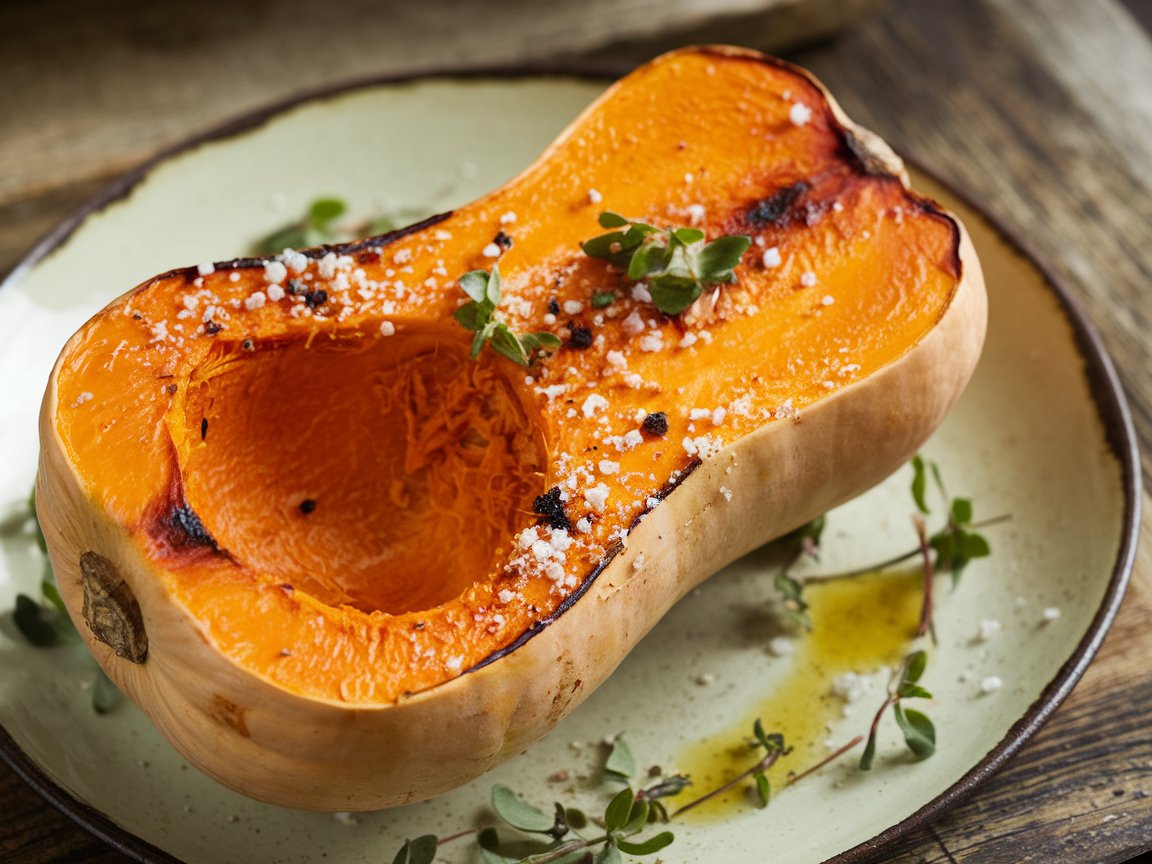Is Roasted Butternut Squash Healthy? Discover Its Nutritional Benefits
Roasted butternut squash is a nutritious and flavorful vegetable that many people enjoy, but it also raises an important question: Is roasted butternut squash healthy? Known for its sweet, nutty flavor, and creamy texture, roasted butternut squash is packed with essential nutrients that can contribute to overall health. In this article, we will explore the nutritional profile of roasted butternut squash and its numerous health benefits while addressing some common concerns.
Nutritional Profile of Roasted Butternut Squash: What Makes It Healthy?
Butternut squash is not only delicious but also packed with essential nutrients. Here’s a closer look at what makes it a healthy choice:
Key Nutrients in Butternut Squash: Vitamins and Minerals
- Vitamins: First and foremost, roasted butternut squash is rich in vitamins A, C, and E, which support immune function and skin health. Specifically, vitamin A is particularly important for vision and immune health.
- Minerals: Additionally, butternut squash contains potassium and magnesium, both of which are vital for heart health and muscle function.
For more detailed information on the health benefits of butternut squash, check out this Health Benefits of Butternut Squash.
Caloric Content and Fiber in Roasted Butternut Squash
- Low-Calorie Nature: One cup of roasted butternut squash has approximately 82 calories. Therefore, it makes a great addition to any meal without adding excessive calories.
- High Fiber Content: With about 7 grams of fiber per cup, it promotes digestive health and helps maintain a feeling of fullness.
If you’re interested in other high-fiber foods, you might enjoy our article on Top High-Fiber Vegetables.
Health Benefits of Roasted Butternut Squash: Why You Should Include It in Your Diet
Incorporating roasted butternut squash into your diet can provide numerous health benefits. For instance:
Antioxidant Properties of Butternut Squash
The presence of beta-carotene gives butternut squash its vibrant orange color and acts as a powerful antioxidant. Consequently, antioxidants help combat oxidative stress in the body, potentially reducing the risk of chronic diseases.
Immune System Support from Roasted Butternut Squash
Moreover, vitamins A and C play crucial roles in bolstering the immune system. Regular consumption can help your body fight off infections more effectively.
Digestive Health Benefits of High Fiber in Butternut Squash
Furthermore, the high fiber content aids digestion by promoting regular bowel movements and preventing constipation. For more information on fiber-rich foods, see our guide on Benefits of Dietary Fiber.
Heart Health Benefits of Potassium in Butternut Squash
In addition to these benefits, potassium in butternut squash helps regulate blood pressure levels, contributing to overall cardiovascular health.
Weight Management with Low-Calorie Roasted Butternut Squash
Finally, being low in calories yet high in fiber makes roasted butternut squash an excellent choice for those looking to manage their weight while still enjoying flavorful meals. For more tips on healthy eating habits, see our guide on Healthy Eating Tips.
Cooking Tips for Roasted Butternut Squash: How to Maximize Flavor
To maximize flavor when preparing roasted butternut squash, consider these tips:
Preparation Techniques for Roasting Butternut Squash
- Peeling and Cutting: Use a sharp knife to peel the skin before cutting it into cubes. This ensures even cooking.
Best Roasting Methods for Butternut Squash
- Best Practices: Toss cubed squash with olive oil, salt, and pepper before roasting. Additionally, spread them out on a baking sheet to allow for proper caramelization.
For more tips on preparing vegetables, check out our guide on How to Roast Vegetables Perfectly.
FAQs About Roasted Butternut Squash: Common Questions Answered
- Is roasted butternut squash healthy?
- Yes! It is low in calories and high in essential nutrients.
- Can I eat the skin of butternut squash?
- While the skin is edible, it is often tough; most people prefer to peel it before cooking.
- How do I store leftover roasted butternut squash?
- Store it in an airtight container in the refrigerator for up to 5 days.
- What are some recipes using roasted butternut squash?
- Try adding it to salads or blending it into soups like Creamy Butternut Squash Soup.
- Why does my butternut squash soup taste bland?
- Insufficient seasoning or not using enough aromatics like garlic or onion can lead to blandness.
Conclusion: Enjoying the Health Benefits of Roasted Butternut Squash
In conclusion, roasted butternut squash is not only a delicious addition to your meals but also offers numerous health benefits. By understanding how to prepare it properly and selecting ripe squash, you can enjoy this nutritious vegetable in various dishes. Therefore, incorporate more roasted butternut squash into your diet today for a tasty and healthy option! This version ensures that the keyphrase “roasted butternut squash” appears clearly in the introduction while maintaining clarity throughout the article. Internal links are also included to enhance navigation within your website.
